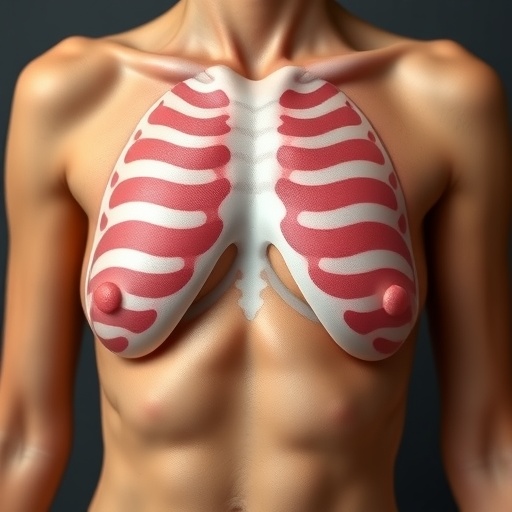In a groundbreaking study published in BMC Cancer, researchers have unveiled a compelling link between myosteatosis—a condition characterized by the infiltration of fat within skeletal muscles—and advanced stages of breast cancer in young women. This discovery shines a new light on the intricate relationship between body composition and tumor biology, suggesting that muscle quality could serve as an important biomarker for disease severity in breast cancer.
The study focused on a cohort of 190 young women, aged 20 to 40 years, all newly diagnosed with invasive ductal breast carcinoma. Importantly, these patients underwent detailed abdominal computed tomography (CT) scans, which enabled the research team to evaluate various parameters of body composition quantitatively. By analyzing the images at the level of the third lumbar vertebra, researchers could precisely measure skeletal muscle area, skeletal muscle radiodensity (SMD), intermuscular adipose tissue (IMAT), and total adipose tissue, encompassing both visceral and subcutaneous fat compartments.
Extensive statistical analysis revealed that over two-thirds of the participants presented with advanced cancer stages (III or IV), a subset that exhibited a markedly higher prevalence of myosteatosis. Specifically, high levels of intermuscular adipose tissue were significantly associated with these advanced stages of the disease. This association held firm even after adjusting for potential confounders, with elevated IMAT doubling the odds of being diagnosed at later cancer stages.
The implication that muscle fat infiltration correlates with tumor aggressiveness could herald a paradigm shift in how clinicians approach breast cancer assessment. Conventional imaging and tissue biopsies focus primarily on tumor characteristics; however, this study underscores the systemic nature of cancer and how alterations in muscle composition might mirror or influence tumor behavior.
Interestingly, the study also delved into molecular subtype correlations, finding that higher IMAT was linked with more aggressive cancer subtypes, including triple-negative and HER2-positive tumors. These subtypes are frequently associated with poorer prognoses and limited targeted treatment options. Conversely, higher skeletal muscle radiodensity—indicative of better muscle quality—was inversely correlated with luminal B and HER2-overexpressing tumors, hinting that muscular health could mitigate aspects of tumor severity.
These findings highlight the nuanced role of myosteatosis beyond mere muscle mass loss. While sarcopenia, the loss of muscle quantity, has been extensively studied in cancer, this research highlights that the composition and quality of muscle—namely, the degree of fat infiltration—may be just as critical in predicting disease outcomes.
The underlying mechanisms linking myosteatosis with breast cancer aggressiveness remain to be fully elucidated, but the study hypothesizes that adipose tissue within muscles may create a pro-inflammatory milieu conducive to tumor progression and metastasis. Fat-laden muscle tissue often exhibits heightened secretion of adipokines and cytokines, which could foster a tumor-friendly environment both locally and systemically.
Moreover, this study’s emphasis on young women with breast cancer is particularly salient, as this demographic often faces distinct biological tumor behaviors and treatment challenges compared to older populations. Understanding how body composition factors interact with tumor biology in younger patients could open up novel avenues for personalized therapeutic strategies.
The utilization of abdominal CT imaging as a non-invasive method to assess myosteatosis and related body composition metrics offers a promising clinical tool. By integrating such assessments into standard diagnostic workflows, oncologists might better stratify patients according to risk and tailor interventions more effectively.
This research also prompts a reevaluation of nutritional and exercise interventions in breast cancer care. Since myosteatosis represents a modifiable aspect of body composition, strategies aimed at reducing muscle fat infiltration—such as resistance training and targeted nutritional support—might improve clinical outcomes when combined with conventional cancer therapies.
While the cross-sectional nature of this study limits causal inference, the robust associations it uncovers warrant further longitudinal investigation. Tracking changes in myosteatosis over time could provide deeper insights into how muscle quality impacts patient prognosis and response to treatments.
Accordingly, ongoing and future clinical trials might benefit from incorporating muscle radiodensity and IMAT assessments as biomarkers to monitor therapy efficacy and disease progression. Such integrative approaches could elevate the precision of oncological care and ultimately enhance survival rates.
Overall, this compelling study moves the needle forward in cancer research by linking muscle fat infiltration to disease severity in young breast cancer patients. The findings advocate for a holistic view of cancer as a systemic condition influenced by factors beyond the primary tumor site, urging clinicians and researchers to expand their focus to include musculoskeletal health.
As breast cancer continues to be a prevalent and life-altering diagnosis globally, innovations like these promise to refine diagnostic criteria and empower targeted interventions. The nexus between body composition and cancer severity could soon become a cornerstone in the multidisciplinary management of breast malignancies.
In essence, the infiltration of adipose tissue into skeletal muscle tissue—myosteatosis—emerges not just as a marker of deteriorating muscle quality but also as a potential harbinger of aggressive tumor characteristics and poor prognostic outcomes, particularly in younger women with breast cancer. Future research aimed at unravelling the molecular crosstalk between muscle adiposity and tumor biology holds exciting potential for novel therapeutic breakthroughs.
Subject of Research: Investigating the association between myosteatosis (fat infiltration in skeletal muscles) and disease severity markers, including TNM stage and tumor molecular characteristics, in young females newly diagnosed with breast cancer.
Article Title: Myosteatosis is associated with advanced TNM stage and tumor features in young females with breast cancer.
Article References:
Costa-Pereira, J.P., Macêdo, I.F., Barbosa, G.A. et al. Myosteatosis is associated with advanced TNM stage and tumor features in young females with breast cancer. BMC Cancer 25, 1576 (2025). https://doi.org/10.1186/s12885-025-15047-2
Image Credits: Scienmag.com
DOI: https://doi.org/10.1186/s12885-025-15047-2
Tags: adipose tissue and disease severityadvanced cancer in young womenBMC Cancer publication findingsbody composition and tumor biologycancer stage and muscle healthCT scans in cancer diagnosisintermuscular adipose tissue impactinvasive ductal carcinoma studymuscle infiltration in cancermyosteatosis and breast cancerskeletal muscle quality as biomarkeryoung women cancer research





